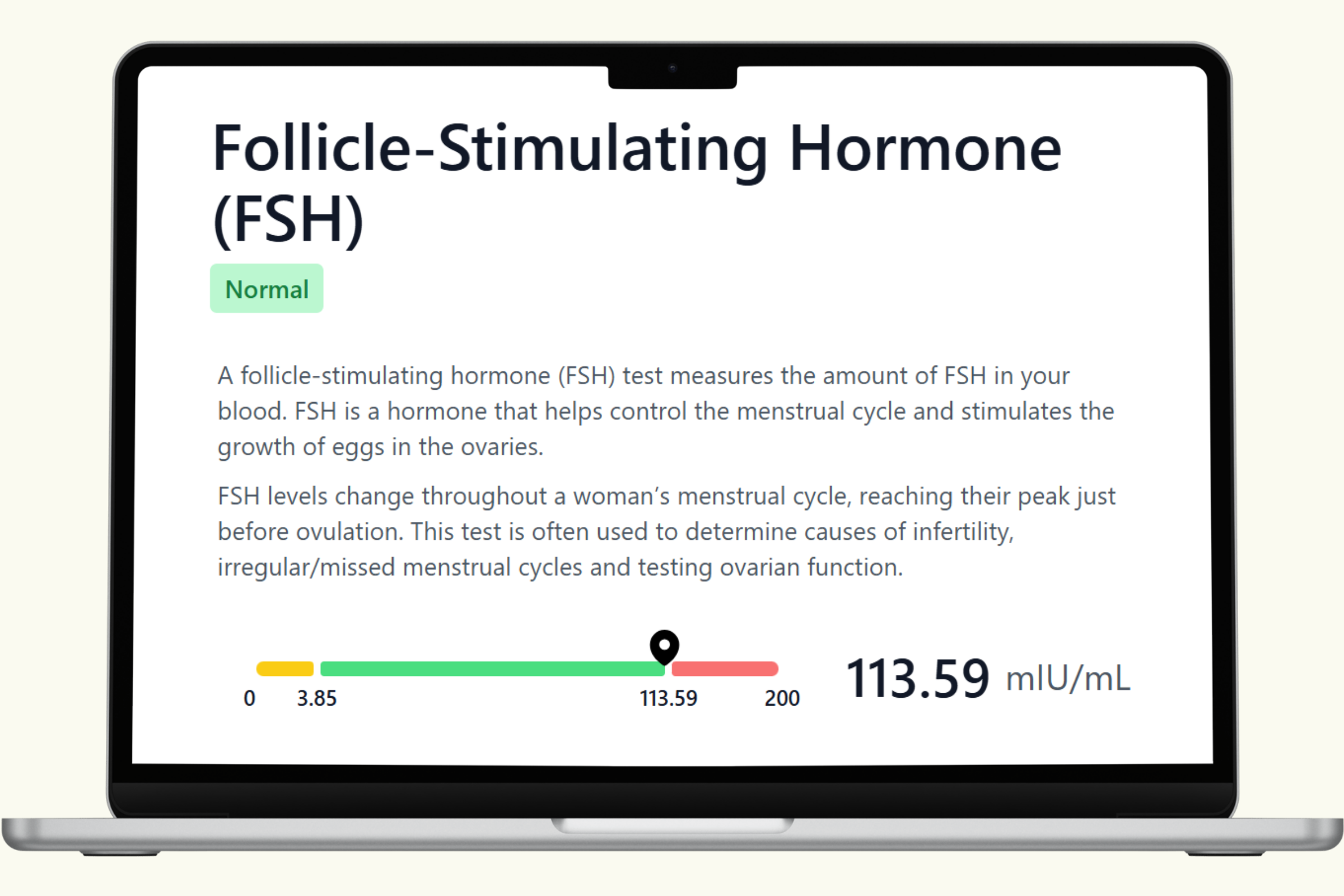Follicle-Stimulating Hormone (FSH) Blood Test: A Vital Marker for Women’s Fertility
The Follicle-Stimulating Hormone (FSH) Blood Test, part of the PlexusDx Women’s Fertility Blood Test, provides critical insight into reproductive health, ovarian function, and overall fertility potential. FSH is a hormone made by the pituitary gland that plays a central role in regulating the menstrual cycle and stimulating the growth and maturation of ovarian follicles, which eventually release eggs during ovulation. Because of its pivotal role, measuring FSH is one of the most informative ways to assess fertility status and investigate potential hormonal imbalances.
What is FSH and Why is it Important?
FSH works hand-in-hand with luteinizing hormone (LH) to regulate the menstrual cycle and support healthy egg development. Early in the menstrual cycle, FSH levels rise to stimulate the growth of follicles in the ovaries. As follicles grow, they produce estrogen, which prepares the uterine lining for potential implantation. Once estrogen reaches a certain threshold, LH surges to trigger ovulation. Without adequate FSH, this delicate hormonal sequence can falter, leading to irregular cycles, anovulation (lack of ovulation), or reduced egg quality.
Why Test FSH?
FSH testing offers valuable information for women at different stages of life, but it is especially important for those experiencing fertility concerns. Doctors often order this test for the following reasons:
- Infertility evaluations: To determine if irregular ovulation is contributing to difficulty conceiving.
- Irregular or absent periods: To investigate potential hormonal imbalances that disrupt the menstrual cycle.
- Ovarian reserve assessment: FSH levels can indicate how well the ovaries are functioning and how many eggs may remain.
- Early signs of menopause: Rising FSH levels may point toward perimenopause or premature ovarian insufficiency.
- Monitoring hormone balance: To assess overall reproductive function in combination with other fertility-related biomarkers.
Reference Ranges for FSH
FSH levels fluctuate naturally throughout a woman’s menstrual cycle and also change with age. Below are commonly used reference ranges for reproductive-age women:
- Follicular phase (day 3 of cycle): 3 – 10 mIU/mL
- Mid-cycle peak (before ovulation): 4 – 25 mIU/mL
- Luteal phase (after ovulation): 2 – 8 mIU/mL
- Postmenopausal: 25 – 135 mIU/mL
Functional/optimal ranges are often considered narrower, with many fertility specialists preferring FSH levels under 10 mIU/mL on day 3 of the menstrual cycle for women trying to conceive. Higher levels may suggest declining ovarian reserve, even if other hormones remain within normal limits.
How FSH Affects Fertility
FSH levels provide a snapshot of ovarian function and fertility potential. Both elevated and abnormally low levels can have consequences:
- High FSH: May signal diminished ovarian reserve, premature ovarian failure, or perimenopause. In these cases, the body increases FSH in an effort to stimulate egg production, but the ovaries respond less effectively.
- Low FSH: Can indicate issues with the pituitary gland or hypothalamus, leading to inadequate stimulation of the ovaries and disrupted egg maturation.
Because egg quantity and quality are central to fertility, understanding FSH levels helps guide fertility treatments, timing decisions, and overall reproductive planning.
FSH and Ovarian Reserve Testing
One of the most common uses of the FSH test is in assessing ovarian reserve. When measured on day 3 of the menstrual cycle, FSH offers clues about the number of eggs remaining in the ovaries. While no single test can predict fertility with certainty, combining FSH with other markers such as Anti-Müllerian Hormone (AMH) and estradiol provides a clearer picture of reproductive potential.
Symptoms of FSH Imbalances
Women may not always experience noticeable symptoms of abnormal FSH levels, but potential signs include:
- Irregular or missed periods
- Difficulty conceiving
- Hot flashes or night sweats (if levels are high due to early menopause)
- Unexplained mood changes
- Low libido
Specimen Collection with PlexusDx
The PlexusDx Women’s Fertility Blood Test uses an at-home dried blood spot collection method with an ADX card. This simple process involves a quick finger prick and a few drops of blood collected on a specialized card. Once mailed back, your sample is analyzed in a certified laboratory, providing accurate results without the inconvenience of scheduling a lab appointment.
Benefits of FSH Testing with PlexusDx
- Convenient at-home collection: No need for clinic visits or blood draws.
- Comprehensive fertility insight: FSH is measured alongside other key hormones, offering a complete picture of reproductive health.
- Early detection: Identify potential hormone imbalances before they progress to more severe fertility issues.
- HSA/FSA eligible: Use pre-tax healthcare dollars to cover the cost.
- Personalized health decisions: Test results can guide conversations with your healthcare provider and help plan next steps in your fertility journey.
What to Do if Your FSH Levels Are Out of Range
If your results show abnormal FSH levels, it is important to discuss them with your healthcare provider. Depending on your fertility goals and medical history, next steps may include:
- Additional testing: Such as AMH, estradiol, or ultrasound imaging of the ovaries.
- Fertility treatments: Options may include ovulation induction, IVF, or egg preservation strategies.
- Lifestyle adjustments: Optimizing sleep, stress management, and nutrition may help balance hormone levels.
- Medical management: Addressing pituitary or thyroid conditions if they are affecting hormone balance.
Conclusion
The Follicle-Stimulating Hormone (FSH) Blood Test is a cornerstone in evaluating women’s fertility and reproductive health. By measuring how well the ovaries respond to hormonal signals, FSH provides essential information about ovarian reserve, menstrual cycle function, and potential causes of infertility. When combined with other biomarkers, FSH testing offers a powerful window into a woman’s reproductive potential and helps guide personalized care.
With the convenience of at-home dried blood spot collection through PlexusDx, women can take proactive steps to monitor their fertility health and make informed decisions about their reproductive future.

Share:
Thyroid-Stimulating Hormone (TSH) Blood Test
Estradiol (E2) Blood Test